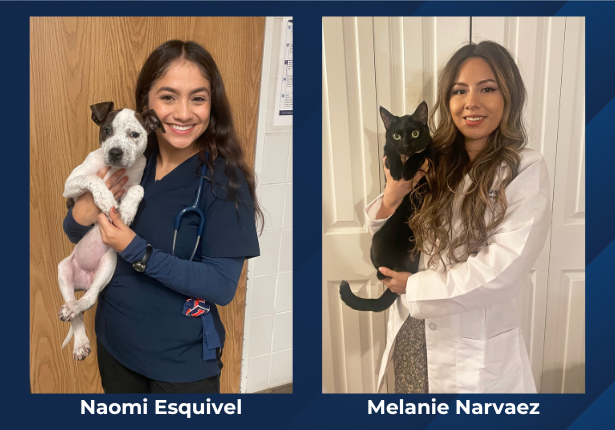Naomi Esquivel and Melanie Narvaez, both members of the Class of 2025, have been recognized by the American Association of Veterinary Medical Colleges (AAVMC) for their leadership in diversity, equity, and inclusion.
Throughout their time at Illinois, these students have led organizations and planned events that have created opportunities for students from underrepresented communities.
Merck and Lowrie Scholarships
Naomi Esquivel was one of only 22 veterinary students nationally selected for the Merck Animal Health Diversity Leadership Scholarship. This scholarship recognizes outstanding contributions to enhancing diversity and inclusion in veterinary medicine through academic projects, extracurriculars, and community outreach.

From among the 22 winners of the Merck award, Esquivel was selected to receive the AAVMC Patricia M. Lowrie Diversity Leadership Scholarship. This honor recognizes a student who has shown exemplary promise as a future leader in enhancing diversity, equity, and inclusion within academic veterinary medicine.
When she was a second-year veterinary student, Esquivel co-founded the Illinois chapter of the Latinx Veterinary Medical Association (LVMA).
“Since co-founding the LVMA, our campus feels more welcoming. That was the goal when we decided to get this club going and I think we’ve done a great job,” Esquivel says. “There are so many cultural events that we host that invites everyone to experience the Latine culture, and it’s so nice to see how much support we receive.”
Last year, Esquivel organized a program to bring students from historically underrepresented populations to the college’s annual public open house. Along with arranging buses to bring 55 Chicago high school students from underrepresented communities to the event, she also created an itinerary for the students to make the most of the opportunity.
Broadening Perspectives in Underserved Communities
“For most youth coming from an underserved community, higher education is unobtainable because the opportunities are very limited,” Esquivel says. “So, hosting students from my community and other low-income communities, providing the resource that my younger self didn’t have, and broadening their perspective so that they know they can exist in these spaces by bringing them to the Vet Med and undergraduate campus has been one of my greatest accomplishments.”

The Latine Villiage Bus Program is now set to run annually, giving prospective students the opportunity to learn more about the College of Veterinary Medicine for years to come.
“I feel so blessed to have a seat at the table, honored that my voice was heard, and forever grateful to be a part of a program that worked with me to make everlasting change,” Esquivel notes. “I can’t wait for the day that one of those students is admitted into the Illinois Veterinary Medicine program!”
In addition, Esquivel helped create an Open House exhibit staffed by LVMA members. This exhibit reached thousands of visitors with interactive materials and engaging activities.
“To be recognized at this scale, for a project that I started with my heart at the center, I can’t even explain how thankful I am,” Esquivel states. “This award solidifies that I am meant to be here, that I do belong, and that this work is so important, further pushing me to transcend.”
Chewy Veterinary Leaders Program
Melanie Narvaez was one of 15 veterinary students nationally selected for the Chewy Veterinary Leaders Program. The program, offered this year for the first time, combines financial assistance and professional development to provide resources to individuals from underserved communities and increase representation within the veterinary profession.

“Being awarded this scholarship and joining a cohort of wonderful veterinary students throughout the nation, as well as connecting with motivating and dedicated veterinary mentors, has been an honor,” Narvaez says.
“I am so excited for the opportunities and support to continue to make a difference in the veterinary field. Imposter syndrome is something that I and many other students who look like me and who have shared similar experiences, face daily. These efforts emphasize how essential it is to have a more diverse and inclusive veterinary community. Underrepresented students deserve to recognize their purpose in veterinary medicine, and together, we have the power to help those who are following in our footsteps.”
Serving the Illinois Veterinary Community
At Illinois, Narvaez has served as the LVMA president during a period when the board “brought our chapter to its fullest potential.” She planned Latin dance workshops and worked with the team to successfully host the college’s first annual Latin Night.

Serving on college’s DEI-focused student club, VOICE, Narvaez brought her passion for raising awareness of invisible disabilities. “I was able to plan a veterinary American Sign Language/Deaf Culture lunch lecture and lead an Invisible Disabilities panel, allowing veterinary students and staff to tell their stories.”
As part of the student wellness committee, Narvaez helped organize mental health-related events, such as body positivity workshops and arts and crafts workshops to help students de-stress.
“Serving the Illinois veterinary community through these club-sponsored events has given me the privilege to be a part of the mission to create a safe space for underrepresented students,” she says. “I hope to continue to grow as a leader, represent my culture with pride, and one day serve the Spanish-speaking community that made me who I am today!”
“If any young individuals are reading this that come from underserved communities or have faced the struggles of being underrepresented in higher education, I encourage you to follow this passion,” Narvaez explains. “Vet Med needs you, and together we can help those who follow us to create an even stronger field of medicine.”
By Haley Maser




